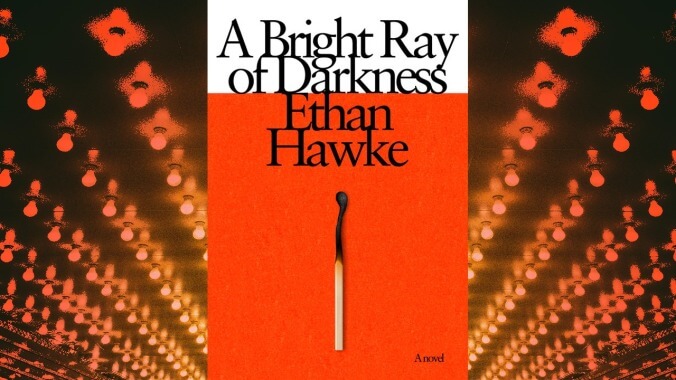Ethan Hawke muses on acting, scandal, and divorce in the engrossing A Bright Ray Of Darkness

Ethan Hawke is not here to bullshit you. The names and details are changed slightly, but the actor’s new novel, A Bright Ray Of Darkness, is very clearly about three things: Ethan Hawke; the 2003 stage production of Shakespeare’s Henry IV, in which he starred; and his very public separation from Uma Thurman that same year, amid allegations of his infidelity. It’s not a memoir, but it’s hard not to read it as one, even after a note ahead of the title page assures us that this is “a work of fiction and dedicated to a dead dog.”
Hawke’s fictional alter ego is William Harding, an actor who returns to New York after filming a movie in South Africa and discovers that the media is abuzz with the news that he cheated on his wildly famous wife during the trip. The opening scene spells this out in no uncertain terms, with a cab driver berating him for being no different than the “shiny fake” celebrities. A tabloid fixture, he’s embraced only by his Henry IV castmates, with whom he spends the next several months pretending to be someone else. “Though my whole world was collapsing around me, there was one thing I still possessed,” he writes. “I have always been a good actor.”
The book, a trim 256 pages, oscillates between his work on the play, his earnest attempts to separate fame and fatherhood, and the drunk, depressing hookups that are inevitably colored by his tabloid infamy. Hawke’s prose isn’t unlike his acting—amiable, punchy, and prone to monologues—and his talent for rounding out the story with verbose oddballs remains as enjoyable now as it was in 1996’s The Hottest State and 2002’s Ash Wednesday. Appropriately, A Bright Ray Of Darkness divides itself by “acts” and “scenes,” structuring itself so each periphery character gets a chance to pontificate uninterrupted. It’s charming at times (see: problematic, coke-addled actor Dean Deadwilder) and tiresome in others (see: Ezekiel, a fellow Henry IV actor who never once registers as a flesh-and-blood human), but never uninteresting.
Hawke, a rubbery actor whose career has long pivoted between stage and screen, has invaluable, accessible insight into both the culture of Broadway and the experience of enduring it as a relative outsider. He juxtaposes the lofty rhetoric of the theatrically minded, who tend to frame performance as holy and universal, with the personal, unglamorous memories that truly fuel art. It also accepts that, in art, affectation can be genuine. There’s nothing idealistic about acting.
And that speaks to Hawke’s musings on contradiction and the acceptance of powerlessness. One can be a mess of a human and an immaculate performer. One can be both valuable and inessential. A marriage can be beautiful and doomed. Not everything is intricately connected. “Can you see that today is not a bridge to anywhere else?” a character asks. The question of how to be present and how to relinquish control isn’t a novel one, but it takes on resonance when set against the art of theatrical performance, which asks the actor to re-create a series of moments over and over again as the world rages and inflames around them.
It can be alienating to witness an artist unpacking their craft, insular as it is, but the author’s clear-eyed writing here helps the reader better appreciate the rawness of his screen and stage work, if only for how fiercely he’s wrestled with its effect on his own identity. He’s never been one to disappear into roles. You always know you’re watching Ethan Hawke. The same goes for his writing. He can call this character William Harding, but he’s not bullshitting you. This is a book about Ethan Hawke, and that’s exactly why it works.
Author photo: Michael Loccisano/Getty Images